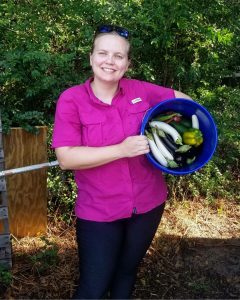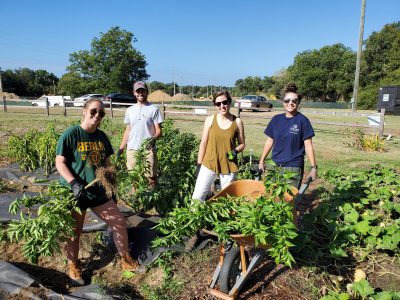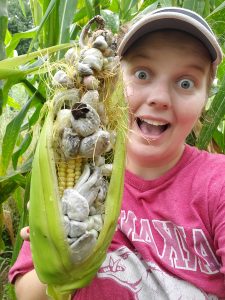Located on West Samford Avenue, The Auburn University Community Garden is a touchstone for sustainable eating practices in the Auburn-Opelika area. Operated by Tiger Dining, they purpose their land for multiple uses. The Garden hosts faculty, students, and community members alike who want to participate in growing their own food. Some plots are also used to grow crops that are sold to local restaurants. Alongside these efforts, the garden devotes 20 of their plots (which totals roughly 12,000 square feet) to grow food that they donate to either Campus Kitchens—an on-campus organization working towards alleviating food insecurity in our area—or to the East Alabama Food Bank.

Marley Halter, Manager of Auburn’s Community Garden
Though the garden does an exceptional job of providing the means to eat healthily and locally, their focus is on educating people about gardening practices. “We are also an outdoor classroom,” said Marley Halter, manager of the garden. “My goal is to make the garden a classroom, so that students are coming out to the garden to use it as a teaching space.” Halter elaborates that the primary purpose of the Community Garden is education. The garden facilitates education through encouraging classes to visit, but they also host several educational events that provide people with resources to garden as well as information about the importance of local gardening efforts.
Marley has a dynamic position as the manager of the garden. Working under the umbrella of Tiger Dining gives her a unique opportunity to engage with students. Oftentimes, she uses her expertise from the garden as a way into critical discussions about sustainable living. She hopes to broaden her managerial position to allow her to be the liaison for sustainability within Tiger Dining. This includes a potential collaboration with the Nutritional Resource Center that will soon be added to campus.
Eating locally is an issue close to Marley’s heart, which informs her work at the community garden. When speaking on the issue, she remarked “If we are going to seriously do something about climate change, we are going to have to focus more on local food.” According to Halter, eating locally comes with a wealth of benefits: your food tends to be more nutritional, you can reduce your carbon footprint, it helps to boost local economies, and it strengthens social ties. Halter emphasizes, however, that you do not have to get all your food locally to make a difference. “If you can get most of your food or the majority of your food locally then you are already making a huge difference and having a huge impact on your community and on the world.”

A group working in Auburn’s community garden, taken by Marley Halter
When she relocated to Phoenix, Arizona, Marley was met with a starkly different environment. An urban center in a much different climate than Arkansas, Phoenix offered her new insights into gardening and sustainability. She got involved with a local community garden, first volunteering, but she quickly became invested and ended up taking on many managerial roles. What stood out to her most about this experience was the cultural and social impact on community gardening. When asked about her time in Phoenix, Halter said “I realized that you don’t have to be a farmer necessarily…to do this, to impact your local community. You can start it with a group of friends, you can start it with your neighbors, and you can still grow a lot of food. You can grow a lot of culturally, socially, nutritionally meaningful food.”Given her experience in the world of gardening and sustainability, it is no surprise that she brings so much enthusiasm and vision to her position. Marley has been gardening since she was in college. In her undergraduate years, she had an internship at an organic farm in rural Arkansas. This experience was what made her fall in love with gardening. By working closely with the woman who owned this farm, she gained an intimate knowledge of all that goes into running a small-scale organic farm. Whether it was balancing finances, securing relationships with local farmer’s markets and grocers, or simply getting her hands dirty, Marley soaked in every experience. She remarks how empowering it was to work at a woman-owned farm. Women in agriculture are very underrepresented, so watching a female farmer own and operate a highly successful farm made a huge impact on her career.

Community Garden Manager Marley
Halter takes a smiling selfie with some corn.
These lessons inform her work here at Auburn, especially as she continues to learn what it means to form a community around gardening. She defines sustainability not only as the effort to conserve the earth’s resources but also an effort to build equitable, viable communities. She is most interested, now, in the social and cultural importance of food, particularly in how these attachments to food can bring humans together.
One of these moments happened quite recently. Marley recalls a day when she was harvesting in the garden and a student worker noticed large, grey fungal growths on some of the corn. The student recognized the fungus, also called corn smut, and she explained that in Mexico, the smut is called huitlacoche and is often used in Mexican cooking. The student was excited because her roommate—who is Mexican—used to eat the food often, so she brought the corn smut back to her apartment. Her roommate called her father and he gave them a recipe, excited that she was able to find huitlacoche, which is seldom sold in the United States. Apparently, her family had been cooking with huitlacoche for generations. All the roommates prepared dinner together and learned how to cook with the corn smut. That evening, they were able to find human connection around the cultural significance of an ingredient that, in America, would likely be thrown away. “To me, that was it. I had this moment as she told me that story where I said, ‘This is what a community garden is supposed to be.’ Facilitating those kinds of experiences is on my radar.”
To get involved with the community garden, visit the Community Garden website to find out about their Monthly Community Days, and to follow them on Facebook or Instagram.
Post Contributed by Chloe McMahon, Office of Sustainability Program Coordinator.




